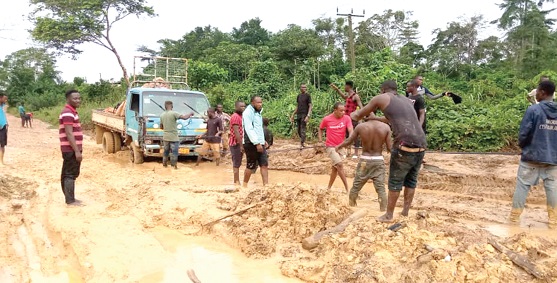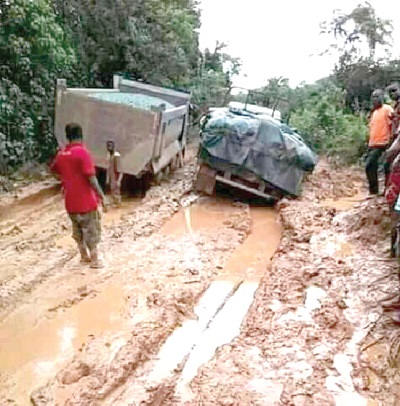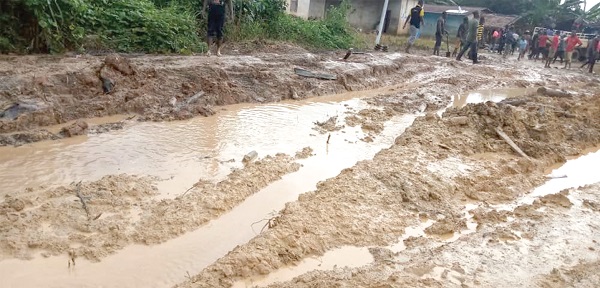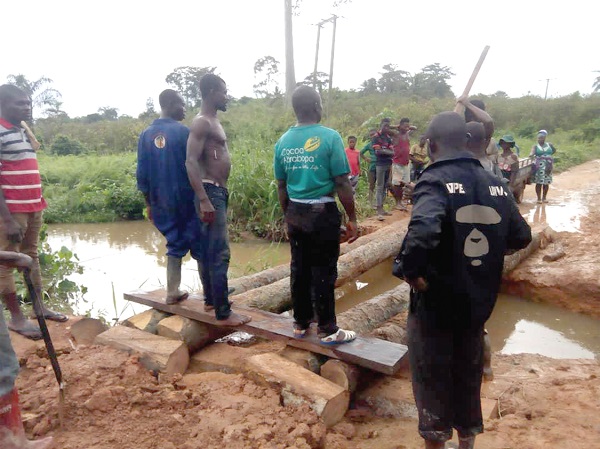
Deplorable roads – a blot on our conscience
A number of trucks loaded with goods and foodstuff were stuck in the mud.
Some vehicles had also yielded to hours of zigzag movement occasioned by the bumpy, ragged and deplorable roads while their owners worked tirelessly to get them back on the road.
Advertisement
Several days of torrential rains in the area aggravated the situation resulting in the emergence of gullies and mini streams across the road. No vehicle could move from one side to the other as sections of the road had been obstructed by the breakdown vehicles.
It was the early hours of the day, but scores of residents of the communities along the two major towns had gathered at various sections of the road and were trying to do their own thing.

These frustrated road users had a hell of time on the deplorable road
Some of them were busy trying to create wooden bridges over the gullies on the road to aid movement.
They wondered why roads in an area that prides itself as a hub of cocoa production in the country had been left to rot in that manner.
This is the sad state of the Enchi-Elubo Road in the Aowin municipality in the Western North Region.
The residents in communities such as Kromokrom, Kwawu, Omanpe, Nkwanta no.1, Nkwanta no.2, Jema, Boinso, Ngakain and Asemkrom are bearing the brunt of the deplorable roads.
It was an eye-sore to see the painful ordeal residents of the predominantly mining and cocoa growing communities go through in the hands of dead roads that led to nowhere.
Ordeal
Farmers in the municipality are counting their losses because most of their farm produce are rotting away because of the bad roads.
The residents also bemoaned the negative impact the dead roads were having on healthcare delivery in their communities as they found it difficult to transport patients to other areas for medical care.
They said academic activities had been affected because many of the children who commuted considerable distances to school found it difficult to do so.
A member of the Aowin South Concerned Youth, Mr Patrick Afful, narrated how monitoring of basic schools had stopped because of the inaccessible roads.
“As of now, circuit supervisors and other officials of the Ghana Education Service (GES) cannot move to communities to supervise because the roads are too bad.
Nurses, agriculture extension officers and veterinary officers can also not go about their daily routine to deliver health care and essential services to the people, and it is sad for us here,” he said.
Mr Afful, who is also the head teacher of Catholic Experimental School at Enchi, described the neglect of the roads in the area as an infringement on their rights as citizens, adding "we produce the gold and cocoa that generate so much revenue for this country, but look at the roads we get in return."
The Paramount Chief (Omanhene) of the Aowin Traditional Area, Beyeeman Tano Kwaw Benbuin III, said the deplorable state of the roads in the area had worsened the poverty situation in the area since economic activities had almost halted.

What you see here is not a stream but sections of the Enchi-Elubo road
Wider picture
The state of the roads in the Aowin municipality is just a tip of the iceberg as many more roads in the Western, Western-North and the Central Regions, as well as other parts of the country, are in a deplorable state.
The roads linking Dunkwa-on-Offin, Ayanfuri and other towns to Obuasi, as well as the Tarkwa roads are in such a terrible state that one wonders if they lead to mining and cocoa producing areas.
While the few tarred roads have lost its tarred surface, the majority of the rough roads have developed what can be described as man-holes and gullies that pose great discomfort to road users
The much-talked about Eastern Corridor Roads that have been mentioned in almost every budget statement by successive governments but which never get fixed still remain a blot on the country’s conscience.
The Kpeve-Hohoe; Jasikan-Dodi Papase; Nkwanta-Oti-Damanko stretches of that road are in such a messy state that one wonders if the residents of the Volta and Oti regions are part of the country.
In 2017, the Ministry of Roads and Highways estimated that 61 per cent of roads in the country were poor.
The sector minister, Mr Kwesi Amoako-Atta, who disclosed this said of the country's 72,000-kilometre road network, 23 per cent had been asphalted while 39 per cent are in good shape, with 61 per cent classified as fair or poor.
This stunning statistics indicate that the country's road transportation system is not robust enough to support efficient transportation of goods and services for national development.
Meanwhile, work on many road projects have stalled across the country because the contractors are owed huge amounts of money.

In their frustration, the residents along the Enchi-Elubo road worked to create wooden bridges on cut off sections of the road
Call
Quality road network is a critical infrastructure requirement for sustainable development.
Just as farmers need good roads to cart the produce to market centres, so do businesses thrive when roads are in good condition.
It is for this reason that priority ought to be placed on building a robust road sector capable of improving all aspects of our national life.
This is especially so when road transportation accounts for 96 per cent of passenger and freight traffic in Ghana.



